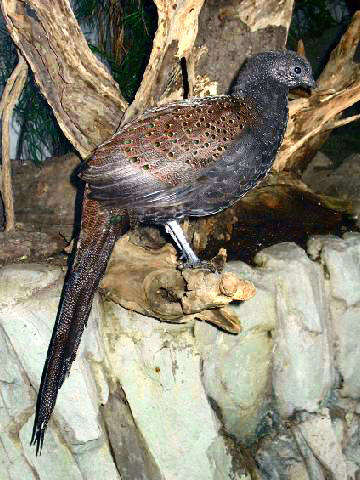|
| Query: Green peacock | Result: 53rd of 72 | |
Mountain Peacock-pheasant (Polyplectron inopinatum) - Wiki
| Subject: | Mountain Peacock-pheasant (Polyplectron inopinatum) - Wiki
| |

| Resolution: 360x480
File Size: 52426 Bytes
Upload Date: 2007:09:28 17:10:50
|
Mountain Peacock-pheasant
From Wikipedia, the free encyclopedia
[Photo] Mountain Peacock-pheasant (Polyplectron inopinatum) taken at Bronx Zoo, New York. Photo by http://en.wikipedia.org/wiki/User:Stavenn | Permission is granted to copy, distribute and/or modify this document under the terms of the GNU Free Documentation License, Version 1.2 or any later version published by the Free Software Foundation; with no Invariant Sections, no Front-Cover Texts, and no Back-Cover Texts. A copy of the license is included in the section entitled "GNU Free Documentation License". |
The Mountain Peacock-pheasant, Polyplectron inopinatum also known as Rothschild's Peacock-pheasant or Mirror Pheasant is a medium-sized, up to 65cm long, blackish brown pheasant with small ocelli and long graduated tail feathers. Both sexes are similar. The male has metallic blue ocelli on upperparts, green ocelli on tail of twenty feathers and two spurs on legs. Female has black ocelli on upperparts, unspurred legs and tail of eighteen feathers. The female is smaller and duller than male.
A shy and elusive bird, the Mountain Peacock-pheasant is distributed and endemic to mountain forests of central Malay Peninsula. The diet consists mainly of berries, beetles and ants.
mtDNA cytochrome b and D-loop as well as the nuclear ovomucoid intron G data confirms that this species belongs to a clade together with the Bronze-tailed Peacock-pheasant, but also the mainland species Germain's Peacock-pheasant and Grey Peacock-pheasant (Kimball et al. 2001).
The molecular data suggests - though not with high confidence - that this species diverged from mainland stock earlier than the Bronze-tailed Peacock-pheasant. This is quite spurious, since its biogeography and derived plumage, and the fact that it is a peninsular mountain endemic indicate it is derived from a fairly small founder population; this would confound molecular analyses. What seems clear is that the present species evolved from mainland Southeast Asian stock, probably during the Late Pliocene to Early Pleistocene (3.6-1 mya). The unique pattern of wings and tail thus is, contrary to long-held opinion, an autapomorphy, and the southern species of this clade - formerly separated in the genus Chalcurus - are probably not each other's closest relatives.
Due to ongoing habitat loss, small population size and limited range, the Mountain Peacock-pheasant is evaluated as Vulnerable on the IUCN Red List of Threatened Species. It is listed on Appendix III of CITES in Malaysia.
http://en.wikipedia.org/wiki/Mountain_Peacock-pheasant
| The text in this page is based on the copyrighted Wikipedia article shown in above URL. It is used under the GNU Free Documentation License. You may redistribute it, verbatim or modified, providing that you comply with the terms of the GFDL. |
|
^o^
Animal Pictures Archive for smart phones
^o^
|
|